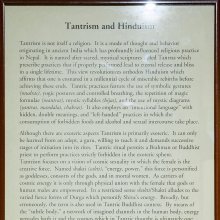Mental activity: 1 definition
Introduction:
Mental activity means something in Hinduism, Sanskrit. If you want to know the exact meaning, history, etymology or English translation of this term then check out the descriptions on this page. Add your comment or reference to a book if you want to contribute to this summary article.
Images (photo gallery)
In Hinduism
Yoga (school of philosophy)
Source: ORA: Amanaska (king of all yogas): A Critical Edition and Annotated Translation by Jason BirchMental Activity is denoted by the Sanskrit term Manovṛtti, according to the Sarvajñānottara 29.40.—Accordingly, while describing the no-mind state: “Having thrown off attachment to sense objects, one should [thus] eliminate one's mental activity (manovṛtti). When one goes to the state of no mind, then that is the supreme bliss”.

Yoga is originally considered a branch of Hindu philosophy (astika), but both ancient and modern Yoga combine the physical, mental and spiritual. Yoga teaches various physical techniques also known as āsanas (postures), used for various purposes (eg., meditation, contemplation, relaxation).
See also (Relevant definitions)
Partial matches: Activity.
Query error!
Full-text (+107): Ayonishas, Indrajalin, Suptacitta, Salayatana, Two causes, Kriyasannirodha, Hetudvaya, Dvihetu, Vinashta, Dvaita, Duality, Hrid, Manodrishya, Janatana, Samirana, Manovritti, Telivi, Vritti, Pracara, Upajagritavasthe.
Relevant text
Search found 115 books and stories containing Mental activity; (plurals include: Mental activities). You can also click to the full overview containing English textual excerpts. Below are direct links for the most relevant articles:
Manusmriti with the Commentary of Medhatithi (by Ganganatha Jha)
Verse 1.53 < [Section XXVIII - Disappearance of Brahmā]
Verse 12.5 < [Section II - The Philosophy of Action and its Retribution (karmayoga)]
Philosophy of language in the Five Nikayas (by K.T.S. Sarao)
4. Conclusion < [Chapter 6 - Summary and Conclusions]
1. Preliminary < [Chapter 1 - Introduction]
7. Mind: A General View < [Chapter 2 - Concept of Philosophy of Language]
Tattvartha Sutra (with commentary) (by Vijay K. Jain)
Verse 8.1 - The causes of bondage (bandha) < [Chapter 8 - Bondage of Karmas]
Verse 9.4 - Definition of gupti (control) < [Chapter 9 - Stoppage and Shedding of Karmas]
Verse 7.33 - The transgressions of Sāmāyika-vrata < [Chapter 7 - The Five Vows]
Preceptors of Advaita (by T. M. P. Mahadevan)
Pratyabhijna and Shankara’s Advaita (comparative study) (by Ranjni M.)
4.1. Upāyas for Mokṣa in Pratyabhijñā < [Chapter 5 - Concept of Māyā in Pratyabhijñā and Advaita]
A Discourse on Paticcasamuppada (by Venerable Mahasi Sayadaw)
Chapter 1 - Relation Between Manodvara And Vinnana < [Part 6]
Chapter 16 - Summary < [Part 10]
Chapter 2 - Recapitulation < [Part 6]
